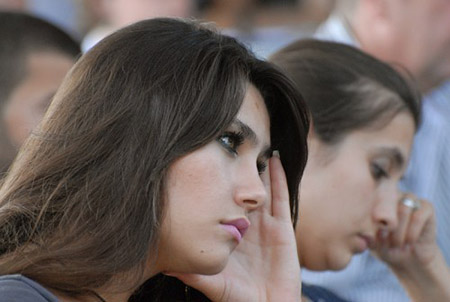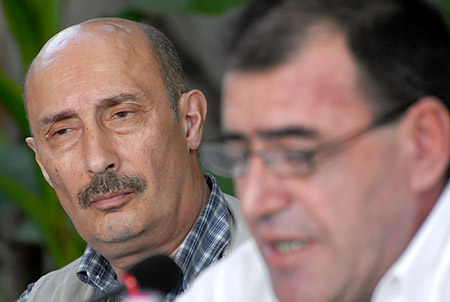With tensions between Armenia and Azerbaijan on the rise in recent weeks, civil society activists and journalists from both countries last month convened in a small ethnic Azeri village in neighboring Georgia to elaborate plans for an independent mechanism to prevent and monitor incidents on the Line of Contact (LOC).
Despite a ceasefire signed in 1994 which put the conflict over the disputed territory of Nagorno Karabakh on hold, thousands have died in frontline skirmishes in the 18 years since. And, with no lasting peace agreement in sight, the International Crisis Group (ICG) continues to warn of the danger of an ‘accidental war‘ breaking out.
The event held in Tekali was co-organized by Armenian actor and director turned peace activist Georgi Vanyan, himself recently targeted by nationalists for attempting to screen non-politicized films from Azerbaijan in Armenia, was a small step in trying to defuse tensions and to prevent civilian casualties along the LOC.
Writing on the Caucasian Circle of Peace Journalism, Armenian journalist and editor Yura Manvelyan commented on the initiative.
There was something else that set the meeting in Tekali apart from many other Armenian-Azerbaijani projects: None of the speakers took on the role of spokesperson for official policies, no-one took up the positions held by the presidents, ministers and their spin doctors. The speakers’ statements seemed not to target their “opponents” from the other side, but mostly focussed on themselves and their “own people”. The recent deaths on the border were a stark reminder of the high price paid for the atmosphere of hatred and showed the distance between those who shed the blood and others who give the orders and seek to consolidate their power and wealth by exploiting the “external enemy” and delaying justice.
[…]
The overwhelming majority of those present voted in favour of action by citizens. Moreover, they reached an initial agreement on creating a rapid reaction group that will take steps to prevent armed clashes on the border and to investigate the situation in the area directly around the border. If necessary, Georgians might also be included in the group. To start with it might include the residents of two border villages: Doctors, taxi drivers, farmers and village elders, who would establish and stay in constant contact with each other. Due to the open nature of the project, anyone who wanted to could become a part of it.
Ilgar Velizade, a journalist and analyst from Azerbaijan, also made a blog post.
This meeting saw the first urgent discussion of the prospects of public intervention to manage the Karabakh conflict. In the opinion of the participants, society has, to this day, taken no steps to end hostilities, and remains far removed from what goes on at the border. Participants emphasized that over the course of the 24 years of conflict, a huge divide has emerged between the two peoples, and that Armenian and Azerbaijani civil society organizations now need to cooperate with one another in order to resolve the situation.
[…]
And so the meeting in Tekali demonstrated once more the Armenian and Azerbaijani public desire for peace to be established in the conflict zone as quickly as possible – and that hope for an effective means to regulate the conflict lives in the hearts of many of the two countries’ citizens. As we say, hope never dies.
The International Crisis Group's Sabine Freizer also remarked on Twitter about the event, as did others observing the peace building processes underway in the South Caucasus.
@peaceforsale: an innovative effort for peace – create a zone for it http://fb.me/23yx8yl1q
@SabineICG: […] @onewmphoto whether war or peace between Armenia + Azerbaijan, civil society can play a key bridging role. Great idea: […]
Global Voices’ Caucasus Editor was also in attendance, and commented on Velizade's post along with Vanyan's initiative for Ararat Magazine.
Whether that intent is as widespread, as Velizade says or as much as Vanyan hopes, remains to be seen, but the first meeting to establish the Monitoring and Rapid Reaction Group was held in Tekali on July 21. Present were representatives from the NGOs and the International Crisis Group. So too were Bernard O’Sullivan and Stephen Young from the Brussels-based Nonviolent Peaceforce, an organization already working in Georgia, Mindanao/Philippines, South Sudan, and elsewhere. O’Sullivan spoke to Ararat Magazine following the public discussion.
“The Tekali Process first of all attracts our interest because clearly people have a need for civil society to act amongst and protect themselves,” he said. “However, we work on the principle of acceptance. We only go to conflict zones where we’re accepted and obviously this includes civil society, but critically it also means the political leadership, i.e. the governments, of all sides. What will come out of the Tekali Process? I see there is very good will here. The Tekali group said it’s not in their interest to get involved in military or political outcomes, but it is for civilians across ethnic groups to protect themselves in a non-violent way. That’s why we’re very interested.”
According to the organizers of the Tekali event, a Caucasus Film Festival will be staged this month in the small village turned regional peacemaking center.












